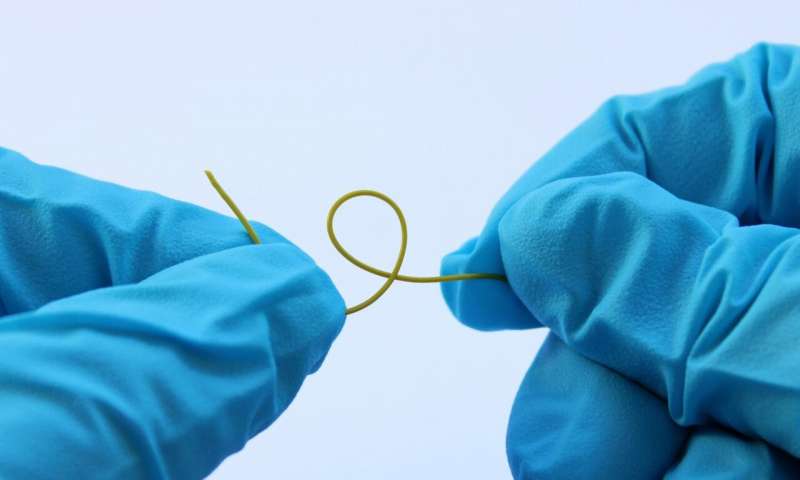German Researchers Develop New Biodegradable Antibiotic Rods To Treat Periodontal Disease
Source: Thailand Medical News Nov 26, 2019 6 years, 2 months, 1 week, 6 days, 15 hours, 28 minutes ago
German Researchers from the Institute of Pharmacy at Martin Luther University Halle-Wittenberg (MLU) have re-combined an already approved active ingredient and filed for a patent for their invention together with two Fraunhofer Institutes from Halle. The innovation would spare patients from having many side effects. The new biodegradable rods promise to provide better treatment for
periodontal disease. Their findings were published in the
International Journal of Pharmaceutics.
 Flexible, biodegradable rods containing antibiotics for periodontitis treatment.
Flexible, biodegradable rods containing antibiotics for periodontitis treatment.
Credit: MLU/faculty marceting NF1
Widespread
periodontal disease is usually caused by bacteria, which leads to an inflammation of the gums or periodontitis. More than 50% of adults in Germany develop periodontal disease in the course of their lives, mostly in old age.
According to projections, more than ten million Germans have a severe form of the disease. Globally the figures are staggering.
Professor Karsten Mäder, head of the Institute of Pharmacy at MLU and study head told
Thailand Medical News via a phone interview, "The body's barrier function is badly disrupted by the large wounds, allowing more substances and bacteria to enter the body."
The inflammation affects the entire body and is often the cause of other diseases such as heart attacks or pneumonia. Therefore, mechanical cleaning procedures are often followed by antibiotics. These are usually administered in pill form, which puts a strain on the entire body. Common side effects are diarrhoea, abdominal pain and nausea as well as skin reactions such as redness and itching. The possible development of resistance to common antibiotics is also a major factor in this form of treatment.
The antibiotic ideally should only act locally in the mouth rather than throughout the entire body. Mäder's research group has therefore combined a proven antibiotic (minocycline) with an equally proven pharmaceutical excipient (magnesium stearate). "The complex is just as effective, but more stable. It slowly releases the antibiotic on the spot," explains Mäder. "In addition to the continuous and sustained release of the antibiotic, we needed to find an easy way of administering it." His research group found a practical solution to this problem by utilising pharma-grade polymers.
The team were able to use these chemical substances to produce flexible, biodegradable rods containing the antibiotic. The small rods can be easily inserted into the gingival pocket. Since they are broken down by the body, they do not have to be removed after treatment. "The rods are much more effective in vitro than previous products on the market," says Martin Kirchberg, who is studying the topic as part of his doctoral thesis. Among other things, Kirchberg has optimised the composition of the polymers in order to achieve exactly the right balance between strength and flexibility and to make them long-lasting. Development is already so advanced that large-scale production would be possible.
The patent for the complex active ingredient and its formulation was
applied for together with the Fraunhofer Institute for Cell Therapy and Immunology IZI and the Fraunhofer Institute for Microstructure of Materials and Systems IMWS, both in Halle, as well as with the Clinic for
Dental Medicine at the University of Bern.
Mäder and Kirchberg each have a 30% stake in the invention, with the remaining 40% shared by scientists from the Fraunhofer Institutes in Halle and the University of Bern. Rapid implementation in clinical studies is possible since all of the pharmaceutical-grade ingredients are already available on the market.
The rods can also be produced using proven techniques so that they can be market ready in just a few years' time. The further development of the formulation and its subsequent market launch will be carried out by PerioTrap Pharmaceuticals GmbH, a start-up company founded by Fraunhofer IZI in Halle.
Reference: Martin Kirchberg et al, Extrudates of lipophilic tetracycline complexes: A new option for periodontitis therapy, International Journal of Pharmaceutics (2019). DOI: 10.1016/j.ijpharm.2019.118794
